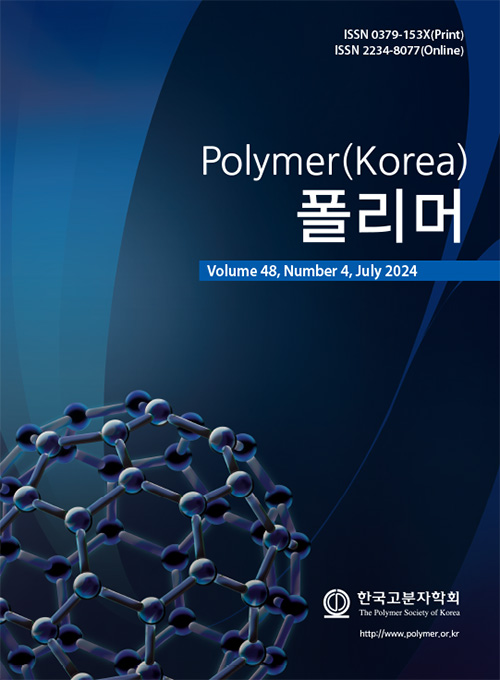- Compatibility on Mechanical Properties of Blends Using Isosorbide-based Bio Polycarbonate
*Advanced Chemical Material R&D Center, Korea Testing & Research Institute, 89 Sepungsandan 1-ro, Gwangyang-eup, Gwangyang-si, Jeollanam-do, Korea
**School of Polymer Science & Engineering, Pusan National University, Busan 46241, Korea- Isosorbide 기반의 Bio Polycarbonate를 적용한 블렌드의 기계적 물성에 대한 상용성 연구
*한국화학융합시험연구원 첨단화학소재센터, **부산대학교 응용화학공학부
Reproduction, stored in a retrieval system, or transmitted in any form of any part of this publication is permitted only by written permission from the Polymer Society of Korea.
In this study, bio polycarbonate(Bio PC)/acrylonitrile butadiene styrene (ABS) blends were manufactured with isosorbide-based Bio PC that replaced bisphenol-A (BPA)-based petroleum PC and improved the incompatibility of the two materials using poly(methyl methacrylate) (PMMA) to secure physical properties suitable for interior and exterior parts of automobiles. Using a micro compounder, the contents of Bio PC and ABS were fixed at 50 wt%, and PMMA was added at 1–10 phr to prepare the specimen, and the physical properties were measured. Tensile and flexural strengths gradually increased and began to decrease when the PMMA content was over 5 phr, and impact strength tended to decrease as the PMMA content increased. In addition, the improvement in compatibility was confirmed by measuring the Tg, and the heat resistance was confirmed through thermogravimetric analyzers (TGA) analysis. To analyze the correlation between physical properties to compatibility, the fracture surface was observed by scanning electron microscope (SEM). As a result, it was confirmed that the dispersibility of ABS was improved in the Bio PC matrix, and that PMMA had an effect on increasing compatibility between Bio PC and ABS materials.
본 연구에서는 bisphenol-A(BPA) 기반의 석유계 polycarbonate(PC)를 대체한 isosorbide 기반의 bio polycarbonate(Bio PC) 소재로 Bio PC/acrylonitrile butadiene styrene(ABS) 블렌드를 제조하고, poly(methyl methacrylate)(PMMA)를 통해 두 소재의 비상용성을 개선하면서 자동차 내∙외장 부품에 적합한 물성을 확보하는 연구를 수행하였다. 마이크로 컴파운더를 활용하여 Bio PC와 ABS를 50 wt%로 고정하고 PMMA를 1–10 phr 첨가하여 시편을 제조하였고, 물성을 측정하였다. 인장, 굴곡강도는 점차 증가하다가 PMMA 함량 5 phr 이상에서 감소하기 시작하였고, 충격강도는 함량이 증가할수록 감소하는 경향을 나타내었다. 또한, 유리전이온도를 측정하여 상용성 개선을 확인하였고, 열중량 분석기(thermogravimetric analyzers, TGA) 분석을 통해 내열성 경향을 확인하였다. 상용성 향상에 대한 물성의 상관관계를 분석하기 위하여 주사전자현미경(scanning electron microscope, SEM)으로 파단면을 관찰하였다. 그 결과, Bio PC 매트릭스에서 ABS의 분산성이 향상됨을 확인하여 PMMA가 Bio PC와 ABS 소재 간의 상용성을 증가시키는 데 영향을 미치는 것을 확인하였다.
Keywords: bio polycarbonate, acrylonitrile butadiene styrene, poly(methyl methacrylate), micro compounder, compatibility.
- Polymer(Korea) 폴리머
- Frequency : Bimonthly(odd)
ISSN 0379-153X(Print)
ISSN 2234-8077(Online)
Abbr. Polym. Korea - 2023 Impact Factor : 0.4
- Indexed in SCIE
 This Article
This Article
-
2024; 48(4): 361-366
Published online Jul 25, 2024
- 10.7317/pk.2024.48.4.361
- Received on Oct 25, 2023
- Revised on Apr 15, 2024
- Accepted on Apr 15, 2024
 Correspondence to
Correspondence to
- Jung Sul Jung
-
Advanced Chemical Material R&D Center, Korea Testing & Research Institute, 89 Sepungsandan 1-ro, Gwangyang-eup, Gwangyang-si, Jeollanam-do, Korea
- E-mail: jsyk38317@ktr.or.kr










 Copyright(c) The Polymer Society of Korea. All right reserved.
Copyright(c) The Polymer Society of Korea. All right reserved.